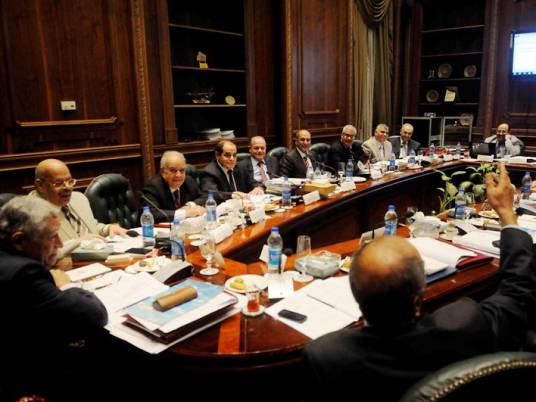
It is part and parcel that any changes in Egypt’s constitution will affect businessmen, investors and business in general in Egypt, which has been suffering over the past three years.
A 10-person committee finished amending the 2012 Constitution in December under then-president Mohamed Morsy, before submitting the finished draft to a committee of 50 to review the changes.
For the first time, the committee of 50 has chosen three “economic figureheads” to represent Egyptian business interests, as well as to add suggestions to articles dealing with Egypt’s long-suffering economy.
These three figures are chief of the Egyptian Federation of Chambers of Commerce, Ahmed El-Wakil, head of the Egyptian Tourism Federation, Elhamy El-Zayaat, and a member of the Federation of Egyptian Industries, Abla Mohy El-Din.
“We are trying to achieve the hopes of 25 January revolution and to provide job opportunities which could be implemented through investments and we are currently suffering from the lack of it,” El-Wakil told Egypt independent.
El-Wakil added that the economic figures in the council of 50 are looking forward to writing a constitution that would encourage injecting investments into the market.
“It could be implemented through articles that highlight the identity of the Egyptian economy and clauses that could give all the guarantees to the public and private capitals in the market,” he elaborated.
Between both the new draft Constitution and 2012’s Constitution, 198 articles have been taken out: two of them addressing the business sector.
One of the main clauses in the 2012 Constitution which sparked controversy was Article 14, part of which said: “Wages should be linked to production.” This has been written off the new draft.
Abdel Moniem Al-Fayyad former minister of finance told Egypt Independent that this phrase was “technical details” and he did not encouraged its presence in the 2012 constitution, though he was not a member of the committee who wrote it.
One of the articles also cancelled in the new draft is Article 16, which tackled issues relating to the countryside and desert areas, stressing that the state is committed to development and improving the lives of residents in these areas.
Articles discussing “nationalization” remained unchanged in both documents.
In the 2013 draft, business sectors including agriculture, industry and tourism were generally addressed and summarized in Article 25, after being discussed independently in articles 15 and 17 in the 2012 constitution.
“We should guarantee the rights of the industries in writing constitution, along with achieving the main economic essentials to boom the national economy,” said Al-Fayyad.
Al-Fayyad asserted that while writing the constitution, economic and business affairs should be highly considered within the article, in accordance with the essentials of economy, the most important essential being development and social justice.
The second constitutional essential is specifying the sector which the country aims to promote, and he believes its more worthy to boom public sectors, but if the state’s targets the private one it should open more markets and investments.
Other economic essentials which should be considered in writing the new constitution is the market and putting some restrictions to avoid monopoly, besides the state’s role to control the economic activity and to save the public property.
Al-Fayyad condemned a change from Article 24 in the 2012 Constitution, which had stressed that “private property” is protected and should serve the national economy without “monopoly.” However this term has been replaced by the term “abuse” in the 2013 Constitution.
Al-Fayyad believes that “monopoly” is an economic term which is more accurate and specific, meaning the state should put price standards regardless the offer and demand system; however “abuse” is more of a vague word.
However, El-Wakil said that it’s not a matter of words; it’s more likely to achieve a “polite” economy within “polite” censorship.
In the same article, the document ruled that the “ownership of private property” could only be removed in particular circumstances, normally when in the public interest and compensation had been paid in advance. All of the above would be regulated by law, the draft said. This has been completely removed in the 2013 draft.
The new draft also removed Article 25 in the 2012 Constitution dealing with “charitable endowments.”
“This is not good,” Al-Fayyad noted. “Many countries encourage the system of charitable endowment.”
Articles handling Egypt’s system of taxation has seen amendments in the 2013 draft too. Article 32 handles taxes and other public financial duties, stressing that they are built on a foundation of “social justice” and that payments are “a duty according to law.”
Amendments to the articles dealing with workers’ rights and conditions have changed. The new draft, through Article 36, asserts that the protection of enterprise is a “civil duty.”
The same article has meanwhile changed the mode of workers’ representation on directorial boards in public sector and business companies.
Al-Fayyad praised these changes, saying that it’s more specific.
Savings are referred to as “a national duty,” protected and encouraged by the state which will guarantee savings, according to law.
“How paying taxes could be a national duty?” Al-Fayyad wondered.
Al-Fayyad emphasized that the new constitution should guarantee articles to safeguard the rights of customer and the small and medium sized enterprises, especially during the current intermittent economic and market fluctuations.
Commenting on changes that could affect business and investment life in Egypt, economic expert and Al-Khebra Al-Arabeya financial manager Magdy Toulba said, “I did expect the target of the 10-person amendment committee to aim at rephrasing articles in the 2012 Constitution, but not to change articles addressing the business and economic sector since they are 'constitutional experts' and this is the job of the 50-person committee.”
Toulba claimed that there was “no doubt” the 2012 Constitution had suffered as a result of structural and organizational problems.
He explained that most of the articles of the 2012 Constitution were vague and unclear.
“The Constitution gives you the feeling that it grants you every single right but after reading the articles carefully you [in fact] realize is withdrawing all those rights,” he said.
Toulba is looking forward to a well-written constitution that explains every article clearly and without generalization.




